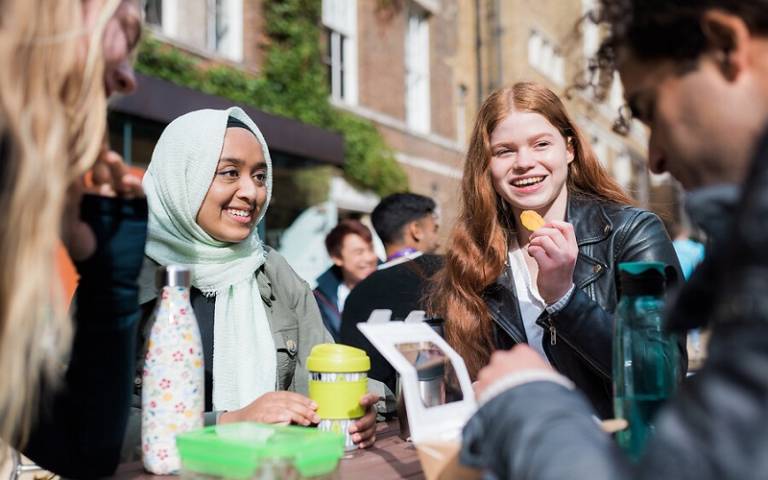Five things you need to know about UCL’s plan to become more inclusive and accessible
18 September 2023
Earlier this year, we asked staff and students about their priorities for making our buildings and associated services more inclusive through a questionnaire and three consultation events.

Our Inclusive Environments Team have reviewed all 630 + responses to our consultation, and alongside further feedback from staff and student inclusion groups and other reports, these have informed our final five-year action plan going to Council in November.
With the answers analysed and the prizes posted, we can share the top five themes from the survey with a key takeaway for each. The biggest priorities raised by our community were:
- Making information about campus more accessible.
- Making information about toilets easier to locate on the move.
- Improving how we provide quiet spaces and design the university to include neurodiverse experience in line with the new guidance in this area.
- Increasing lift coverage.
- Automating more of our heavy doors in corridors and circulation spaces.
What you need to know
Better access to campus information
Since the survey we've updated our AccessAble building guides with What3Words coordinates for all accessible entrances. Information on all of UCL's buildings is available via a dedicated AccessAble UCL web page. Details include transport options, building entrances and receptions, getting around, and WCs.
This is a first step, and better access to data will be a leading priority in our five-year action plan. After providing What3Words coordinates for buildings to AccessAble, they are now adopting this as a standard for all their UK building guides.
Improving access to toilets
The location of all toilets at UCL will be mapped on the UCL Go app in the next year as an on going process. This will make it easier for students, staff, and visitors to use the whole campus.
Our next step is to audit wheelchair accessible toilets so the data on UCL Go gives users clarity on which facilities meet their needs.
Quiet spaces and designing for the mind
We’re reviewing the provision of quiet spaces on campus and reevaluating those that are combined with prayer spaces.
We want to ensure quiet spaces are suitable for neurodiverse people and will be reviewing them against new guidance from the British Standard Institute’s “Design for the Mind”. If using a space in one way prevents it from working in another, we will find a better solution.
The guidance from the PAS 6463 “Design for the Mind” has already started to be brought into building works projects at UCL which builds on the great input from the Neurodivergent Staff Network involvement in projects such as Level 50, School of Management (One Canada Square, Canary Wharf).
Better lift coverage
We want to add more evacuation lifts across UCL. The consultation highlighted the need to improve coverage of lifts that can be used in an emergency.
The Fire Team have welcomed a new member of staff who will focus predominantly on the PEEP (Personal Emergency Egress Plan) process to improve the experience. We are already taking action on the issue whilst we finalise the full action plan. We will share updates in future.
Automating heavy doors
We’ll be installing power-assisted doors on a rolling basis and making sure any future buildings have them fitted as standard. This will be done to a high standard and in compliance with our Fire Safety Strategy.
It will not be possible to fit automated doors in every building, with space, safety, and heritage considerations being a limiting factor but every option will be considered.
Thank you to everyone who took part in the consultation/answered the survey
The survey was conducted online and in-person for four weeks across February and March.
We had support to promote the survey from organisations across the University including the Students’ Union, Enable, Out@UCL, DESG, the Neurodivergent Staff Network, Digital Accessibility Team, Student Support & Wellbeing, our networks of Wellbeing and Green champions and many more. This support was instrumental in getting the word out, and we would not have received the volume and depth of answers that we did without it.
Pip Jackson who led the project spoke about the survey and the next steps:
“I want to say thank you to everyone who answered the survey, and I hope the ten winners of our raffle enjoyed their prizes. I’m grateful to everyone who spoke to their friends about this, spoke to me about what improvements are urgent, or even shared a link. I’ll be presenting the full five-year action plan to Council in November. The subsequent plans will be consulted on just like this one and will build on what we achieve with this plan. We have a long way to go but change is happening and the commitment to Inclusive Design is clearly embedded in the Estates Strategy.”
 Close
Close

